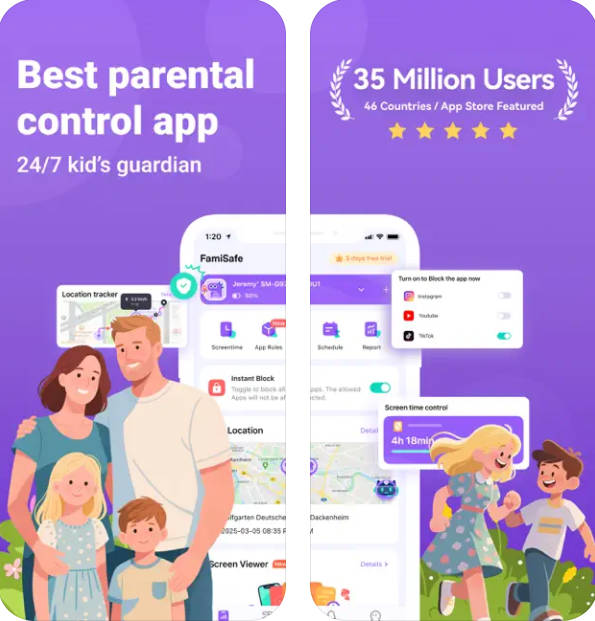Vibing meaning is one of those internet phrases that looks simple but hides a lot of context. When teens say “we’re vibing,” they usually mean they’re in a good mood, enjoying the moment, or getting along effortlessly. It can describe music, a party, a game lobby, even a study session. As a parent, you don’t have to learn every new term—but understanding the meaning of vibing can help you read the room and keep conversations warm. Below, we’ll break down what does vibing mean, how kids use it in chats, and how to talk about slang without killing the vibe 😊.

In This Article
- Part 1. What does vibing mean?
- Part 2. Vibing usages & examples in daily life
- Part 3. How to use vibing in slang and texting
- Part 4. How to talk with your kid about slang
Part 1. What does vibing mean?
Vibing means feeling good, relaxed, or in sync with a person, place, or activity. Think “this feels right.” In daily vibing meaning slang, it’s a quick way to describe a positive mood or smooth connection—sometimes with someone, sometimes with music or a setting.
Parents will most often see three shades of meaning in chats:
- Mood. Kids use vibing to say they’re chill, happy, or focused (e.g., “I’m vibing to this playlist”). It can also signal “immersed, please don’t interrupt.”
- Chemistry. Vibing with someone meaning is easy rapport—conversations flow, humor lands, and time passes quickly. It’s not automatically romantic.
- Fit. Teens also apply it to places, aesthetics, or communities that match their taste: “This café is my vibe,” or “That jacket is my vibe.”
Tip 💡
Don’t jump to romance. If a teen says they’re “vibing with someone,” ask a curious follow‑up (“What do you like about hanging out with them?”) before assuming dating.
Part 2. Vibing usages and examples in daily life
“Vibing” shows up across a teen’s day. Notice how the same word flexes to fit different contexts without losing its core: this feels right.
- Music & chill time 🎧 Teens say they’re “just vibing” when they listen to playlists, draw, or reset after school. It’s their shorthand for being immersed and calm.
- Social chemistry 🤝 “We’re vibing” can capture that instant comfort with a classmate or new group—no labels, just smooth conversation and shared humor.
- Gaming & teamwork 🎮 In online matches, vibing means the squad is in rhythm—clear comms, smarter plays, and better morale even after losses.
- School & clubs 🏫 Students might vibe with a teacher’s style or a project topic when it clicks with their strengths and interests, turning “homework” into “flow.”
- Family time 🏠 “Family vibing night” might be cooking together, movies, or board games. The vibe equals low pressure and easy enjoyment.
- Creative focus ✍️ Coding, journaling, practicing instruments—vibing can also mean quiet deep work with the right playlist and fewer distractions.
Tip 💡
Try asking, “What’s the vibe today—chill or high‑energy?” It shows interest without judgment and keeps teens talking.
Part 3. How to use vibing in slang and texting
Kids don’t just say vibing out loud—it lives in texts, captions, and memes. Here’s how it typically appears, with simple phrases you’ll actually see:
- Everyday texting phrases “Just vibing at home.” / “Vibing to the new track.” / “Low‑key vibing with Alex today.” / “You vibing or stressed?”
- Do’s & don’ts Use vibing in casual chats; switch to clearer language with teachers or applications; don’t assume romance; and avoid slang in serious topics when clarity matters.
- Three quick steps Read the context (playful vs. serious) → mirror the tone (“Nice! I’m vibing with coffee + emails.”) → clarify if needed (“Do you mean chill or connecting?”). This keeps the vibing meaning explicit for everyone.

Tip 💡
Coach teens to consider the audience. In cross‑generation chats, “I’m in a good mood” is often clearer than “I’m vibing.”
Part 4. How to talk with your kid about slang
Staying up‑to‑date with slang isn’t about being “cool”—it’s about understanding your child’s world and keeping them safe. Here are practical strategies supported by parenting experts and digital‑safety advocates:
- Lead with curiosity, not quizzes. Try: “Teach me a new word this week.” Turning slang into a shared game builds trust.
- Set light structures that protect focus. Agree on phone‑free windows (meals, bedtime) and calm places for conversation. Consistency beats one‑off lectures.
- Use tools to support—not spy. FamiSafe helps families set gentle guardrails without reading every message. Tools like Social App Detection, Screen Time, and Web Filter reduce distractions and flag risky content early so you can talk before problems escalate.
- Web Filter & SafeSearch
- Screen Time Limit & Schedule
- Location Tracking & Driving Report
- App Blocker & App Activity Tracker
- YouTube History Monitor & Video Blocker
- Social Media Texts & Porn Images Alerts
- Works on Mac, Windows, Android, iOS, Kindle Fire, Chromebook
Conclusion
What does vibing mean? For most teens, it’s a quick way to say “this feels right”—a calm groove, a friendly connection, or a space that fits. Treat it as a conversation opener, not a red flag. Ask what makes the vibe good and how you can support healthy focus online and offline.
When your family needs a little help keeping distractions low, FamiSafe is there with flexible tools that respect privacy—even while you guide healthy habits online.
Frequently Asked Questions
-
Q1. Does vibing mean dating?
Not necessarily. It usually means people get along or share a good mood. Ask what your teen means rather than assuming romance. -
Q2. Is there a difference between “vibe” and “vibing”?
Vibe is the mood or feeling; vibing is actively feeling it or syncing with it. Example: “The vibe is cozy,” vs. “I’m vibing here.” -
Q3. What does “vibing with someone” mean?
It means natural chemistry or easy rapport. It can be platonic or romantic depending on the context and tone.


